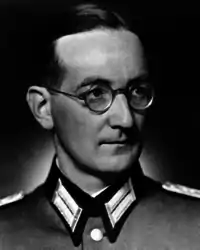Alexis von Roenne
Alexis Freiherr von Rönne (22 February 1903 – 12 October 1944) was a German Army colonel and intelligence analyst who was executed in the aftermath of the 20 July Plot to assassinate Adolf Hitler.[1] One of Hitler's favoured analysts in the Abwehr, von Roenne was not directly involved in the plot but was nonetheless tried and executed in the aftermath of the plot thanks to links with many of the conspirators.
Alexis von Roenne | |
|---|---|
 | |
| Birth name | Alexis von Roenne |
| Born | 22 February 1903 Tukums, Latvia |
| Died | 12 October 1944 (aged 41) Berlin, Germany |
| Allegiance | German resistance |
| Service/ | Wehrmacht |
| Years of service | 1939–1944 |
| Rank | colonel |
| Spouse(s) | Ursula von Bülow |
Life
A veteran of the First World War, von Roenne rose through German intelligence to head Foreign Armies West (Fremde Heere West), the branch of the Abwehr tasked with espionage on the Western Front. Referred to by modern historians as 'Hitler's favourite intelligence analyst'.[2]
However, a staunch Christian with beliefs at odds with the Nazi Party, historians believe that he led a double life by deliberately misleading Hitler and the German general staff. A key promoter of intelligence gained from British campaigns like Operation Mincemeat (the deception plan for the Allied invasion of Sicily) and Operation Bodyguard (disguising the intended target of the Normandy landings), his actions may have helped to save thousands of lives.[3]
Death
Arrested in the immediate aftermath of the July 20 plot thanks to his connection with several of those responsible but released shortly afterwards, von Roenne was rearrested on 9 August and tried before Roland Freisler's People's Court on 5 October.[4] Declaring that Nazi race policies were inconsistent with his Christian values, he was found guilty by the show trial and hanged on a meat hook at Plötzensee Prison on 12 October. His final epitaph to his wife reflected his faith, stating 'in a moment now I shall be going home to our Lord in complete calm and in the certainty of salvation.'[2]
Background information
A new movie about Operation Mincemeat, to begin pre-production in 2019, uses a screenplay, written by Michelle Ashford, based on historian Ben Macintyre's 2010 book Operation Mincemeat. The book provides additional specifics about the involvement of von Roenne in the ruse played on the Germans during the Second World War by the British. Forged "documents" claimed that the Allies would invade Greece and Sardinia before the invasion of Sicily, leading Germany to divest important assets to that area. The Baron was said to have vouched for the authenticity of the documents[5] and also accepted other hoaxes used by the Allies during the war.[6]
According to Macintyre,[7]
"he faithfully passed on every deception ruse fed to him, accepted the existence of every bogus unit regardless of evidence, and inflated forty-four divisions in Britain to an astonishing eighty-nine."
A report published by The Independent adds additional perspective on von Roenne's work during the war.[8]
"Colonel Baron Alexis von Roenne, in charge of Fremde Heere West (FHW), the western intelligence arm, who had built his reputation on predicting Allied behaviour early in the war, was wrong on almost every important count other than to discount an invasion of Norway. He was fooled by the fantasy invasion of the Pas-de-Calais and was convinced that the fictitious British Fourth Army in Scotland existed and was about to be redeployed to Kent.
References
- Center, German Resistance Memorial. "German Resistance Memorial Center - Biographie". Gdw-berlin.de. Retrieved 27 November 2017.
- Macintyre, Ben (2010). Operation Mincemeat : the true spy story that changed the course of World War II. London: Bloomsbury. ISBN 9781408809211. OCLC 619515053.
- "Unsung Christian Martyr of the Nazi Regime?". Frted.wordpress.com. 30 January 2012. Retrieved 27 November 2017.
- "Operation Overlord: Colonel Alexis von Roenne". Warfarehistorynetwork.com. Retrieved 27 November 2017.
- "D-Day: Bodyguard of deception was needed to protect the plan: Stephen Ward reports on a complex campaign to give the Germans the wrong impression about British intentions". The Times. 16 January 2010. Retrieved 10 May 2019.
Baron von Roenne, head of the FHW, a man trusted by Hitler, declared them authentic
- "Pandora's Briefcase". The New Yorker. 3 May 2010. Retrieved 10 May 2019.
[von Roenne] hated Hitler and seemed to have done everything in his power to sabotage the Nazi war effort.
- "One of World War II's greatest deceptions is getting the movie treatment with the help of a 'The Pacific' writer". Business Insider. 9 May 2019. Retrieved 10 May 2019.
It is entirely possible, Macintyre suggests, that von Roenne "did not believe the Mincemeat deception for an instant".
- "D-Day: Bodyguard of deception was needed to protect the plan: Stephen Ward reports on a complex campaign to give the Germans the wrong impression about British intentions". The Independent. 13 June 1994. Retrieved 10 May 2019.
Sources
- Macintyre, Ben (2010). Operation Mincemeat. London: Bloomsbury. ISBN 978-1-4088-0921-1